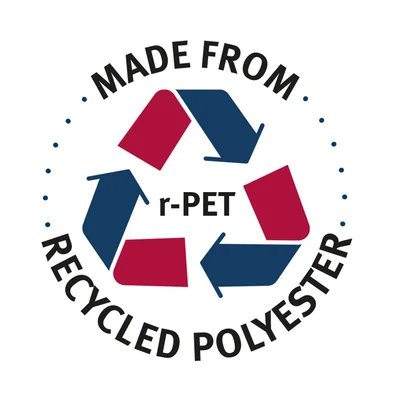Recycled Polyethylene Terephthalate

You may have noticed that many of our new Powertex textile products are labeled as r-PET. But what does that mean?
r-PET stands for recycled polyethylene terephthalate, a material made from PET bottles.
PET, or polyethylene terephthalate, is a type of plastic widely used in the production of carbonated beverage bottles, water bottles, food containers, and various other consumer products. PET is valued for its excellent barrier properties against alcohol and essential oils, its generally good chemical resistance, as well as its high impact resistance and tensile strength.
How PET Bottles Are Turned into Fiber
Turning PET bottles into fibers for use in textile products involves several key steps:
Collecting and Sorting: Used PET bottles are gathered from recycling bins and waste collection centers. They are then sorted to eliminate contaminants and non-PET materials such as caps, labels, and other plastics.
Cleaning and Shredding: The sorted bottles are thoroughly cleaned to remove any residual labels, adhesives, and food particles. After cleaning, the bottles are mechanically shredded into small pieces known as "flakes" or "chips."
Melting and Extrusion: The PET flakes are melted at high temperatures, transforming them into molten plastic. This molten PET is then extruded through a spinneret to create long, fine strands or filaments, similar to those used in traditional textile production.
Drawing and Cooling: The extruded strands are rapidly drawn and cooled to solidify the material. This process aligns the polymer chains within the PET, enhancing the strength and durability of the resulting fiber.
Cutting and Finishing: Once cooled and solidified, the strands are either cut into shorter staple fibers or spun into continuous filaments, depending on the desired end product. Additional processes like crimping and texturing may be applied to improve the fiber's texture and appearance.

Spinning and Weaving: The recycled PET fibers are spun into yarns or threads, which can then be woven or knitted into textiles, such as fabrics, clothing, and other products.
End-Product Manufacturing: These recycled PET threads are used to manufacture various textile products, including clothing, bags, upholstery, and webbing. These products often have similar properties and quality to those made from virgin PET but with a reduced environmental impact due to the use of recycled material.
Recycling PET bottles into fibers and textile products helps reduce the demand for new plastic production, conserve valuable resources, and minimize the environmental impact of plastic waste. This process contributes to broader sustainability efforts and reduces the environmental footprint of the textile industry.
Do you wish to know more about our Lifting KnowHow? Please reach out.
For faster response, call us directly at +47 66 79 95 00!
Meanings of WLL, SWL and MBLLearn about the different meanings surrounding WLL, SWL and MBL. |
Learn more |
What does EWL mean?Learn about Effective Work Length. |
Learn more |
What is r-PET?Learn about products made of recycled plastic. |
Learn more |
What is RFID?Learn about RFID and what it's used for. |
Learn more |
What is Steel Grades?Learn about the different steel grades for lifting equipment. |
Learn more |
Why CE and UKCA marking?Learn about the usage of CE and UKCA markings. |
Learn more |


